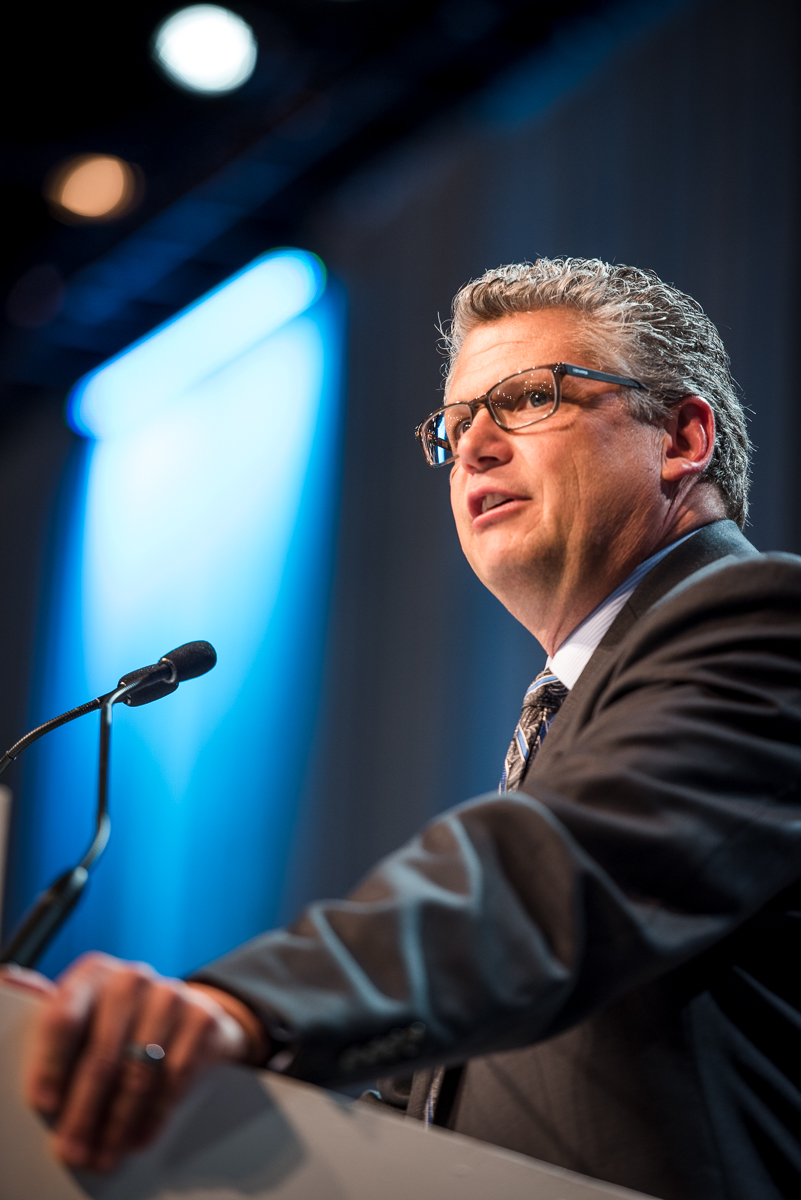
By Kevin Armbrust
MILWAUKEE (July 11, 2016) — Everyone stood at the LCMS convention on Monday.
It was not to applaud, but — at the direction of the Rev. Dr. James A. Baneck, chairman of Committee 6 on Seminaries — as a show of the impact the two Lutheran Church—Missouri Synod seminaries have on all of their lives.
Baneck told the standing assembly, “Floor Committee 6 on Seminaries directly affects each and every one of you. The shaping and forming of faithful pastors is vital to each and every one of us.”
He proceeded to read the entire Resolution 6-02 — “To Uphold the Scriptural and Confessional Qualifications for the Office of the Holy Ministry” — to the convention assembly.
That process required more than 15 minutes, illustrating both the importance and the extensive nature of the doctrine concerning the qualifications for men placed into the Office.
“The Office of the Holy Ministry is located within God’s plan and work of salvation in Jesus Christ,” begins the first “whereas” of Resolution 6-02. Because the Office of the Holy Ministry is not an office instituted by man, but was “instituted and mandated by Jesus Christ to save sinners by ‘giving the Gospel and the sacraments,’ ” the church must take seriously the qualifications given by God for this office.
The Augsburg Confession, Article XIV, states: “It is taught that no one should publicly teach, preach or administer the sacraments without a proper call.”
The sixth “whereas” of Resolution 6-02 outlines three biblical and confessional mandates: examination, call and ordination.
Though there is much to be digested in the whereases of the resolution, the final “whereas,” which begins “God calls pastors to love and care for his people, to minister to them with compassion and understanding,” proclaims the important focus of this committee’s work in concert with that of the seminaries, which Baneck referred to as “the jewels in the crown of our Synod.”
Pastors serve God’s people with the gifts of His Word and Sacraments. This work is entrusted to the men God places in the office.
It is important, therefore, for the Synod in convention to uphold the scriptural and confessional qualifications of the holy ministry, as the first resolve states.
The resolution also makes clear that the Office of the Holy Ministry deserves its honor and respect, but should never be pitted against the role of the laity.
Instead, the office works alongside the laity and both encourage each other in their various roles.
The final resolve ends with a lengthy quotation from the Rev. Friedrich Wyneken, the Synod’s second president.
Resolution 6-02 was adopted by a vote of 875-177. The remaining resolutions from Committee 6 will be addressed later in the convention.
Dr. Kevin Armbrust (kevin.armbrust@lcms.org) is manager of Editorial Services with LCMS Communications.
Learn more
Watch — Livestream and on-demand video
Read — Reporter Online | LCMS.org/convention
View — Photo galleries




What were the policies or changes adopted in this resolution?
Who would vote against this resolution ?
All people are citizens but not all are mayors. The Holy Ministry is God’s unique gift to His people. A congregations called Pastor, following the Good Shepherd, are His under shepherds. They lovingly feed and willingly sacrifice self for the sheep. Pastors are not hirelings; they neither fleece the sheep nor by trickery “pull the wool over their eyes.” John 10
Where can we see the actual resolutions?
Thank you for your post. You will find the actual resolutions in Today’s Business found on the convnetion page at http://www.lcms.org/convention.
So what is the status of Lay Deacons? I can’t get a Call but several local Lay Deacons are “pastoring” churches. Rev. Charles P. Collier. PSWD.
Thank you for your question. You may read more about Licensed Lay Deacons in Public Ministry at .